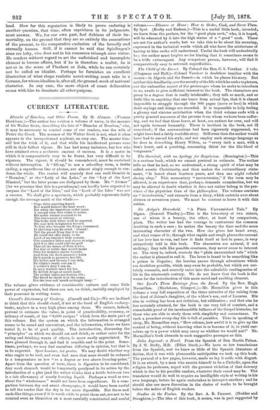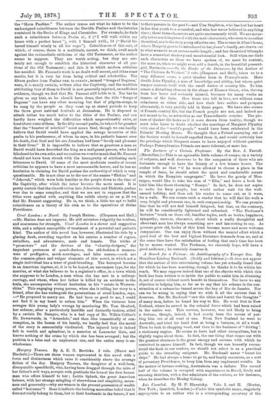the "Hems Paulime." The author traces out what he takes
to be the undersigned coincidences between the Davidic Psalms and the histories contained in the Books of Kings and Chronicles. For example, he finds such a coincidence between Psalm ci., 2 (" I will walk within my house with a perfect heart "), with 1 Samuel xviii., 14 (" David be- haved himself wisely in all his ways"). Coincidences of this sort, of which, of course, there is a multitude, cannot, we think, avail much against the rationalistic criticism of the Old Testament, as the author seems to suppose. They are worth noting, but they are cer- tainly not enough to establish the historical character of all por- tions of the Old Testament ; and this it is which modern criticism has assailed. Mr. Fausset's work is no doubt well meant, and it has some merits, but it is very far from being critical and scholarlike. The fifteen psalms from Psalms cxx. to cxxxiv., termed "Songs of Degrees,' were, it is nearly certain, written after the Captivity, and the tradition attributing four of them to David is now generally rejected, on sufficient evidence, though we find that Mr. Fausset still holds to it. Nor has he given us any hint, as he should have done, that the title "Songs of Degrees" can have any other meaning but that of pilgrim-songs, to be sung by the people as they went up at stated periods to keep the three great national festivals at Jerusalem. He is disposed to attach rather too much value to the titles of the Psalms, and can hardly have weighed the difficulties which unquestionably exist, at least about some of them. In the fifty-second psalm, he takes it for granted that the "boaster of mischief " must mean Saul, though we can hardly believe that David would have applied the savage invective of this psalm to his predecessor, of whom be says, in his pathetic lament over his death, that Saul and his son Jonathan had been "lovely and pleasant in their lives." It is impossible to believe that so generous a man as David would have described the king as a malignant person, who loved falsehood for its own sake, and we confess we wonder much that Mr. Fausset should not have been struck with the incongruity of attributing such bitterness to David. Of some of the most moderate results of recent criticism he appears to have a most unreasonable horror, and he has no hesitation in claiming for David psalms the authorship of which is very questionable. Ho is not clear as to the use of the names "Elohim" and "Jehovah," which were both familiar to the people down to the time of the Captivity, after which the latter became the more usual. It is pretty certain that the classification into Jehovistic and Elohistic psalms was due to some compiler, and that we are not to suppose that the titles were applied with anything like subtle nicety, as on p. 21 we find Mr. Fausset suggesting. He is, we think, a little too apt to build coincidences on a theory of his own as to the operations of divine Providence.



































 Previous page
Previous page